Research Critique: Examining Missed Nursing Care in Hospital Settings
VerifiedAdded on 2022/11/29
|8
|1741
|333
Report
AI Summary
This report offers a critical analysis of the research paper by Bragadottir, Kalisch & Tryggvadottir (2017) focusing on the correlates and predictors of missed nursing care in hospitals. The critique examines the research problem, its significance, and the study's design and methods, including the cross-sectional survey of nursing staff in Iceland. The analysis highlights limitations such as the generalizability of findings, the omission of patient and other staff feedback, and the potential impact of Google Translate on the questionnaire's accuracy. The report discusses the study's findings, which link missed nursing care to staffing levels and teamwork, and assesses their relevance to contemporary nursing policy and practice. It concludes by emphasizing the global nature of the problem, highlighting the need for effective measures to address insufficient staff cooperation and improve patient-centric care through adequate staffing, training, and adherence to standard guidelines.
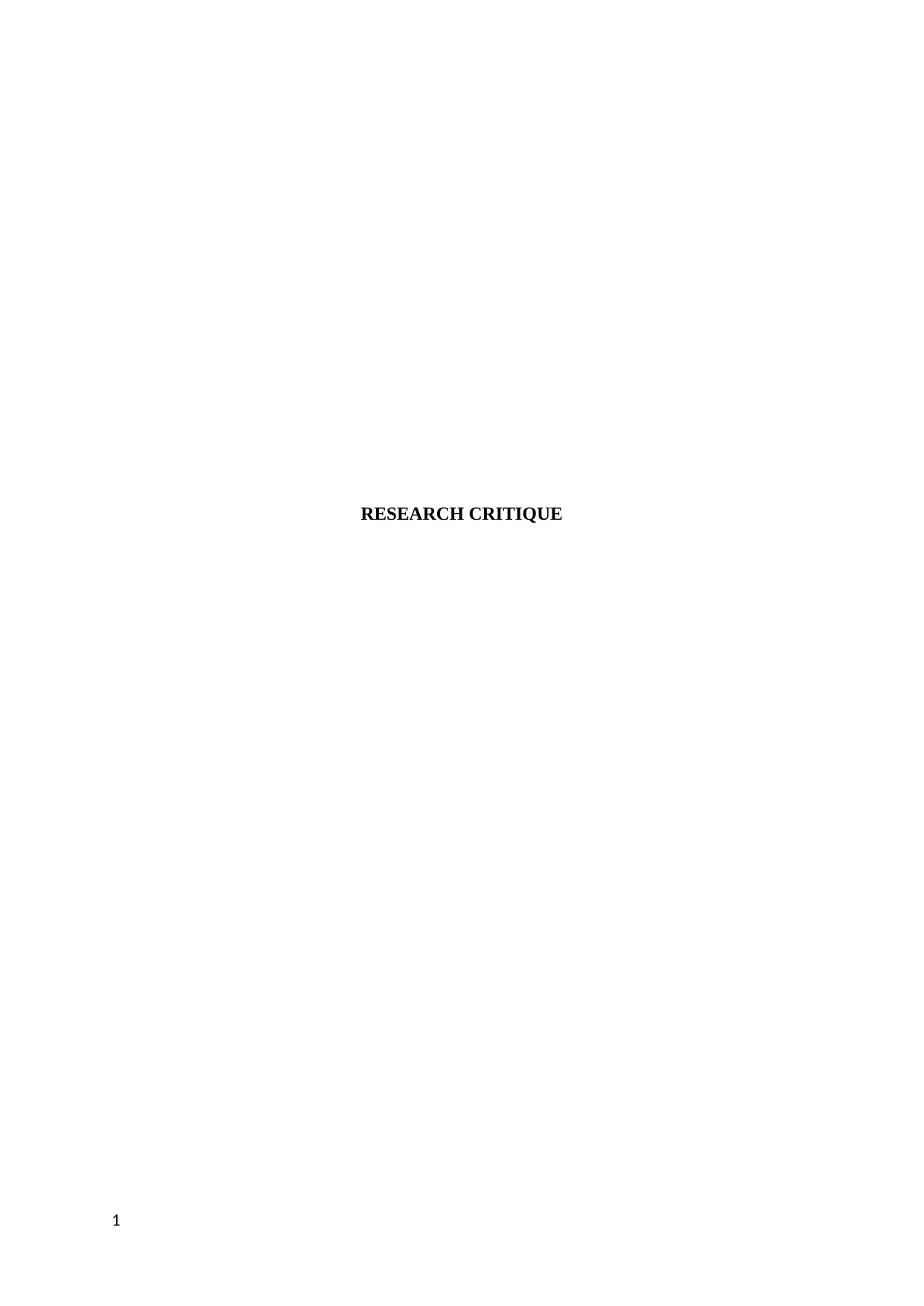
RESEARCH CRITIQUE
1
1
Paraphrase This Document
Need a fresh take? Get an instant paraphrase of this document with our AI Paraphraser
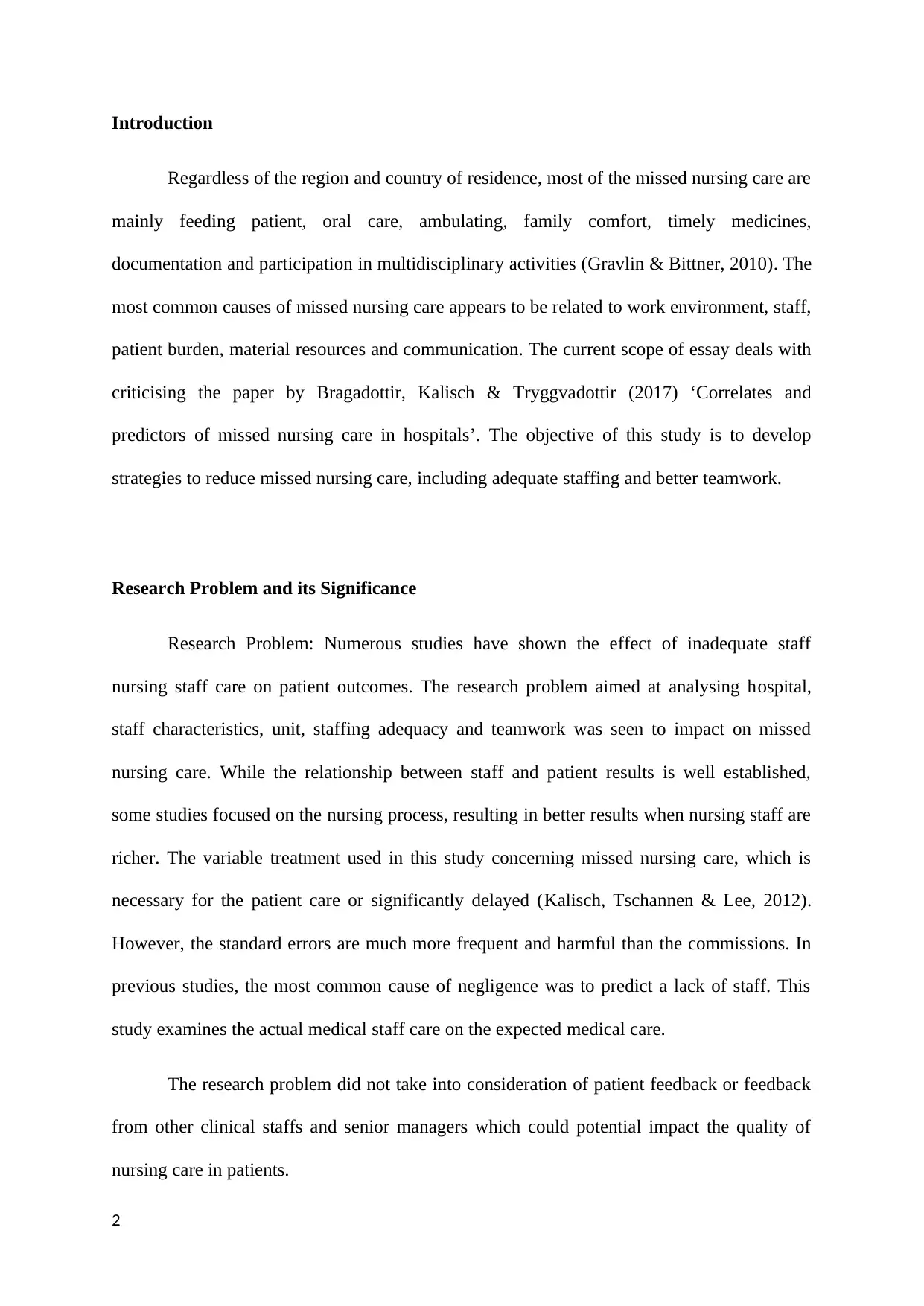
Introduction
Regardless of the region and country of residence, most of the missed nursing care are
mainly feeding patient, oral care, ambulating, family comfort, timely medicines,
documentation and participation in multidisciplinary activities (Gravlin & Bittner, 2010). The
most common causes of missed nursing care appears to be related to work environment, staff,
patient burden, material resources and communication. The current scope of essay deals with
criticising the paper by Bragadottir, Kalisch & Tryggvadottir (2017) ‘Correlates and
predictors of missed nursing care in hospitals’. The objective of this study is to develop
strategies to reduce missed nursing care, including adequate staffing and better teamwork.
Research Problem and its Significance
Research Problem: Numerous studies have shown the effect of inadequate staff
nursing staff care on patient outcomes. The research problem aimed at analysing hospital,
staff characteristics, unit, staffing adequacy and teamwork was seen to impact on missed
nursing care. While the relationship between staff and patient results is well established,
some studies focused on the nursing process, resulting in better results when nursing staff are
richer. The variable treatment used in this study concerning missed nursing care, which is
necessary for the patient care or significantly delayed (Kalisch, Tschannen & Lee, 2012).
However, the standard errors are much more frequent and harmful than the commissions. In
previous studies, the most common cause of negligence was to predict a lack of staff. This
study examines the actual medical staff care on the expected medical care.
The research problem did not take into consideration of patient feedback or feedback
from other clinical staffs and senior managers which could potential impact the quality of
nursing care in patients.
2
Regardless of the region and country of residence, most of the missed nursing care are
mainly feeding patient, oral care, ambulating, family comfort, timely medicines,
documentation and participation in multidisciplinary activities (Gravlin & Bittner, 2010). The
most common causes of missed nursing care appears to be related to work environment, staff,
patient burden, material resources and communication. The current scope of essay deals with
criticising the paper by Bragadottir, Kalisch & Tryggvadottir (2017) ‘Correlates and
predictors of missed nursing care in hospitals’. The objective of this study is to develop
strategies to reduce missed nursing care, including adequate staffing and better teamwork.
Research Problem and its Significance
Research Problem: Numerous studies have shown the effect of inadequate staff
nursing staff care on patient outcomes. The research problem aimed at analysing hospital,
staff characteristics, unit, staffing adequacy and teamwork was seen to impact on missed
nursing care. While the relationship between staff and patient results is well established,
some studies focused on the nursing process, resulting in better results when nursing staff are
richer. The variable treatment used in this study concerning missed nursing care, which is
necessary for the patient care or significantly delayed (Kalisch, Tschannen & Lee, 2012).
However, the standard errors are much more frequent and harmful than the commissions. In
previous studies, the most common cause of negligence was to predict a lack of staff. This
study examines the actual medical staff care on the expected medical care.
The research problem did not take into consideration of patient feedback or feedback
from other clinical staffs and senior managers which could potential impact the quality of
nursing care in patients.
2
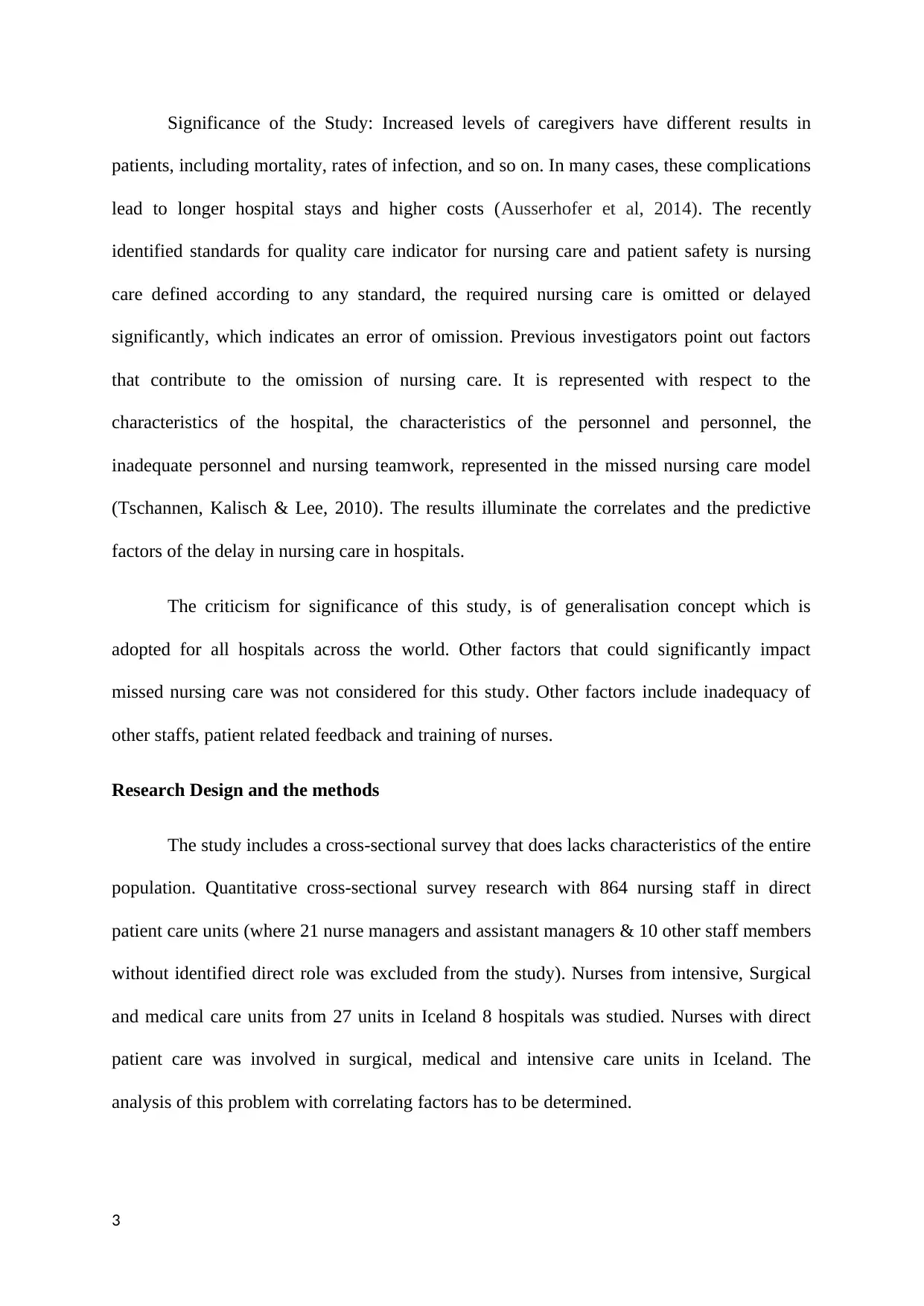
Significance of the Study: Increased levels of caregivers have different results in
patients, including mortality, rates of infection, and so on. In many cases, these complications
lead to longer hospital stays and higher costs (Ausserhofer et al, 2014). The recently
identified standards for quality care indicator for nursing care and patient safety is nursing
care defined according to any standard, the required nursing care is omitted or delayed
significantly, which indicates an error of omission. Previous investigators point out factors
that contribute to the omission of nursing care. It is represented with respect to the
characteristics of the hospital, the characteristics of the personnel and personnel, the
inadequate personnel and nursing teamwork, represented in the missed nursing care model
(Tschannen, Kalisch & Lee, 2010). The results illuminate the correlates and the predictive
factors of the delay in nursing care in hospitals.
The criticism for significance of this study, is of generalisation concept which is
adopted for all hospitals across the world. Other factors that could significantly impact
missed nursing care was not considered for this study. Other factors include inadequacy of
other staffs, patient related feedback and training of nurses.
Research Design and the methods
The study includes a cross-sectional survey that does lacks characteristics of the entire
population. Quantitative cross-sectional survey research with 864 nursing staff in direct
patient care units (where 21 nurse managers and assistant managers & 10 other staff members
without identified direct role was excluded from the study). Nurses from intensive, Surgical
and medical care units from 27 units in Iceland 8 hospitals was studied. Nurses with direct
patient care was involved in surgical, medical and intensive care units in Iceland. The
analysis of this problem with correlating factors has to be determined.
3
patients, including mortality, rates of infection, and so on. In many cases, these complications
lead to longer hospital stays and higher costs (Ausserhofer et al, 2014). The recently
identified standards for quality care indicator for nursing care and patient safety is nursing
care defined according to any standard, the required nursing care is omitted or delayed
significantly, which indicates an error of omission. Previous investigators point out factors
that contribute to the omission of nursing care. It is represented with respect to the
characteristics of the hospital, the characteristics of the personnel and personnel, the
inadequate personnel and nursing teamwork, represented in the missed nursing care model
(Tschannen, Kalisch & Lee, 2010). The results illuminate the correlates and the predictive
factors of the delay in nursing care in hospitals.
The criticism for significance of this study, is of generalisation concept which is
adopted for all hospitals across the world. Other factors that could significantly impact
missed nursing care was not considered for this study. Other factors include inadequacy of
other staffs, patient related feedback and training of nurses.
Research Design and the methods
The study includes a cross-sectional survey that does lacks characteristics of the entire
population. Quantitative cross-sectional survey research with 864 nursing staff in direct
patient care units (where 21 nurse managers and assistant managers & 10 other staff members
without identified direct role was excluded from the study). Nurses from intensive, Surgical
and medical care units from 27 units in Iceland 8 hospitals was studied. Nurses with direct
patient care was involved in surgical, medical and intensive care units in Iceland. The
analysis of this problem with correlating factors has to be determined.
3
⊘ This is a preview!⊘
Do you want full access?
Subscribe today to unlock all pages.

Trusted by 1+ million students worldwide
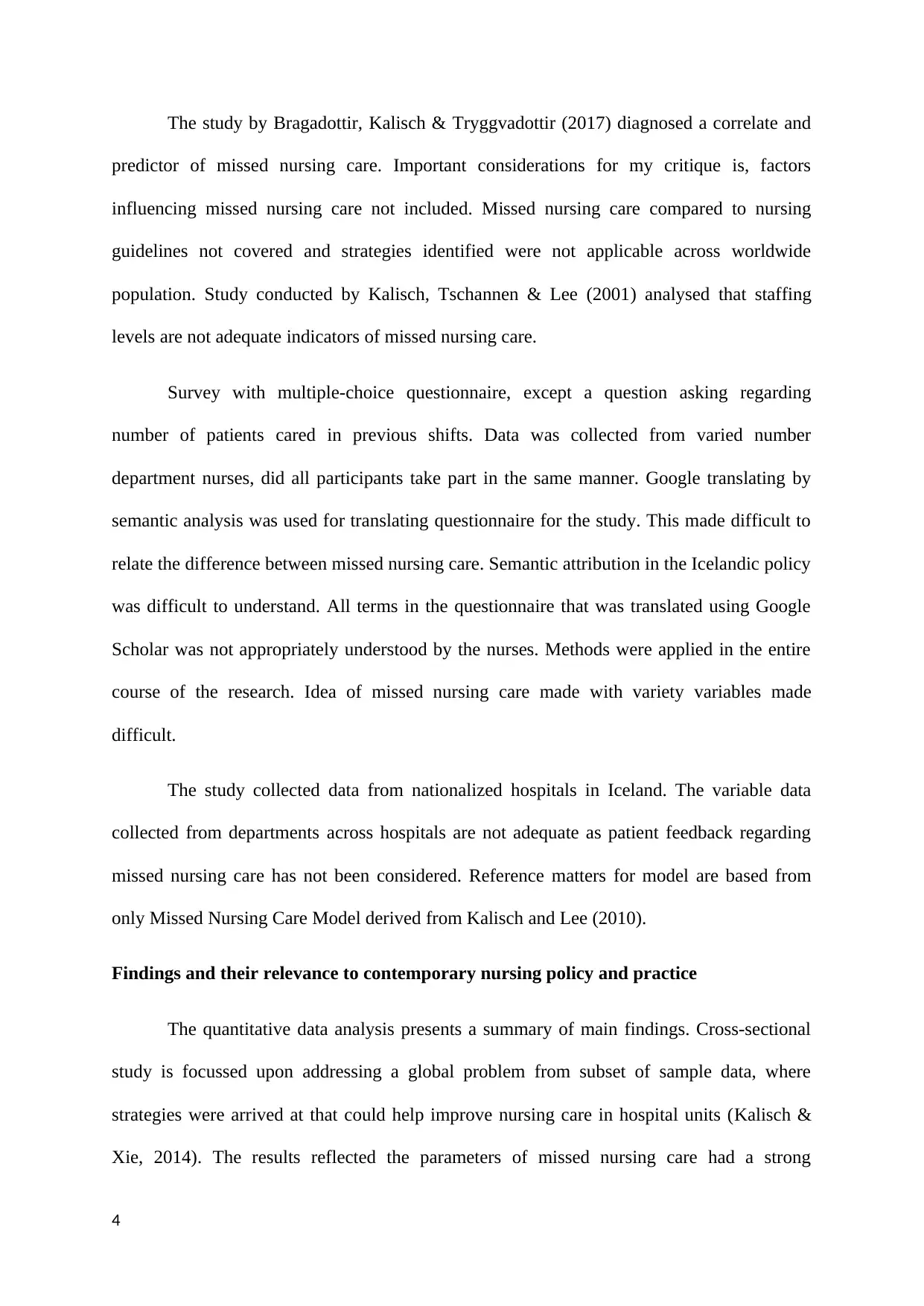
The study by Bragadottir, Kalisch & Tryggvadottir (2017) diagnosed a correlate and
predictor of missed nursing care. Important considerations for my critique is, factors
influencing missed nursing care not included. Missed nursing care compared to nursing
guidelines not covered and strategies identified were not applicable across worldwide
population. Study conducted by Kalisch, Tschannen & Lee (2001) analysed that staffing
levels are not adequate indicators of missed nursing care.
Survey with multiple-choice questionnaire, except a question asking regarding
number of patients cared in previous shifts. Data was collected from varied number
department nurses, did all participants take part in the same manner. Google translating by
semantic analysis was used for translating questionnaire for the study. This made difficult to
relate the difference between missed nursing care. Semantic attribution in the Icelandic policy
was difficult to understand. All terms in the questionnaire that was translated using Google
Scholar was not appropriately understood by the nurses. Methods were applied in the entire
course of the research. Idea of missed nursing care made with variety variables made
difficult.
The study collected data from nationalized hospitals in Iceland. The variable data
collected from departments across hospitals are not adequate as patient feedback regarding
missed nursing care has not been considered. Reference matters for model are based from
only Missed Nursing Care Model derived from Kalisch and Lee (2010).
Findings and their relevance to contemporary nursing policy and practice
The quantitative data analysis presents a summary of main findings. Cross-sectional
study is focussed upon addressing a global problem from subset of sample data, where
strategies were arrived at that could help improve nursing care in hospital units (Kalisch &
Xie, 2014). The results reflected the parameters of missed nursing care had a strong
4
predictor of missed nursing care. Important considerations for my critique is, factors
influencing missed nursing care not included. Missed nursing care compared to nursing
guidelines not covered and strategies identified were not applicable across worldwide
population. Study conducted by Kalisch, Tschannen & Lee (2001) analysed that staffing
levels are not adequate indicators of missed nursing care.
Survey with multiple-choice questionnaire, except a question asking regarding
number of patients cared in previous shifts. Data was collected from varied number
department nurses, did all participants take part in the same manner. Google translating by
semantic analysis was used for translating questionnaire for the study. This made difficult to
relate the difference between missed nursing care. Semantic attribution in the Icelandic policy
was difficult to understand. All terms in the questionnaire that was translated using Google
Scholar was not appropriately understood by the nurses. Methods were applied in the entire
course of the research. Idea of missed nursing care made with variety variables made
difficult.
The study collected data from nationalized hospitals in Iceland. The variable data
collected from departments across hospitals are not adequate as patient feedback regarding
missed nursing care has not been considered. Reference matters for model are based from
only Missed Nursing Care Model derived from Kalisch and Lee (2010).
Findings and their relevance to contemporary nursing policy and practice
The quantitative data analysis presents a summary of main findings. Cross-sectional
study is focussed upon addressing a global problem from subset of sample data, where
strategies were arrived at that could help improve nursing care in hospital units (Kalisch &
Xie, 2014). The results reflected the parameters of missed nursing care had a strong
4
Paraphrase This Document
Need a fresh take? Get an instant paraphrase of this document with our AI Paraphraser
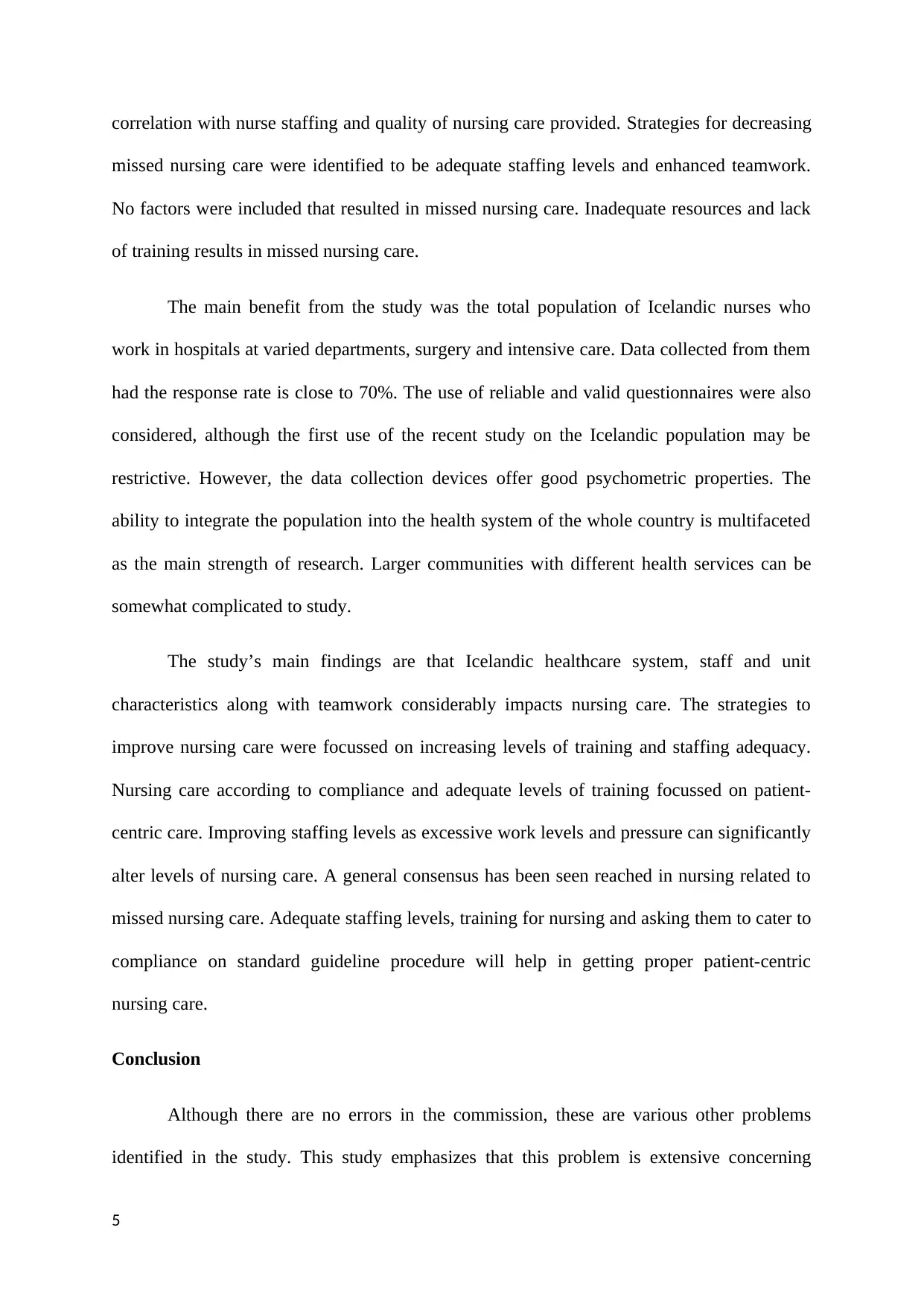
correlation with nurse staffing and quality of nursing care provided. Strategies for decreasing
missed nursing care were identified to be adequate staffing levels and enhanced teamwork.
No factors were included that resulted in missed nursing care. Inadequate resources and lack
of training results in missed nursing care.
The main benefit from the study was the total population of Icelandic nurses who
work in hospitals at varied departments, surgery and intensive care. Data collected from them
had the response rate is close to 70%. The use of reliable and valid questionnaires were also
considered, although the first use of the recent study on the Icelandic population may be
restrictive. However, the data collection devices offer good psychometric properties. The
ability to integrate the population into the health system of the whole country is multifaceted
as the main strength of research. Larger communities with different health services can be
somewhat complicated to study.
The study’s main findings are that Icelandic healthcare system, staff and unit
characteristics along with teamwork considerably impacts nursing care. The strategies to
improve nursing care were focussed on increasing levels of training and staffing adequacy.
Nursing care according to compliance and adequate levels of training focussed on patient-
centric care. Improving staffing levels as excessive work levels and pressure can significantly
alter levels of nursing care. A general consensus has been seen reached in nursing related to
missed nursing care. Adequate staffing levels, training for nursing and asking them to cater to
compliance on standard guideline procedure will help in getting proper patient-centric
nursing care.
Conclusion
Although there are no errors in the commission, these are various other problems
identified in the study. This study emphasizes that this problem is extensive concerning
5
missed nursing care were identified to be adequate staffing levels and enhanced teamwork.
No factors were included that resulted in missed nursing care. Inadequate resources and lack
of training results in missed nursing care.
The main benefit from the study was the total population of Icelandic nurses who
work in hospitals at varied departments, surgery and intensive care. Data collected from them
had the response rate is close to 70%. The use of reliable and valid questionnaires were also
considered, although the first use of the recent study on the Icelandic population may be
restrictive. However, the data collection devices offer good psychometric properties. The
ability to integrate the population into the health system of the whole country is multifaceted
as the main strength of research. Larger communities with different health services can be
somewhat complicated to study.
The study’s main findings are that Icelandic healthcare system, staff and unit
characteristics along with teamwork considerably impacts nursing care. The strategies to
improve nursing care were focussed on increasing levels of training and staffing adequacy.
Nursing care according to compliance and adequate levels of training focussed on patient-
centric care. Improving staffing levels as excessive work levels and pressure can significantly
alter levels of nursing care. A general consensus has been seen reached in nursing related to
missed nursing care. Adequate staffing levels, training for nursing and asking them to cater to
compliance on standard guideline procedure will help in getting proper patient-centric
nursing care.
Conclusion
Although there are no errors in the commission, these are various other problems
identified in the study. This study emphasizes that this problem is extensive concerning
5
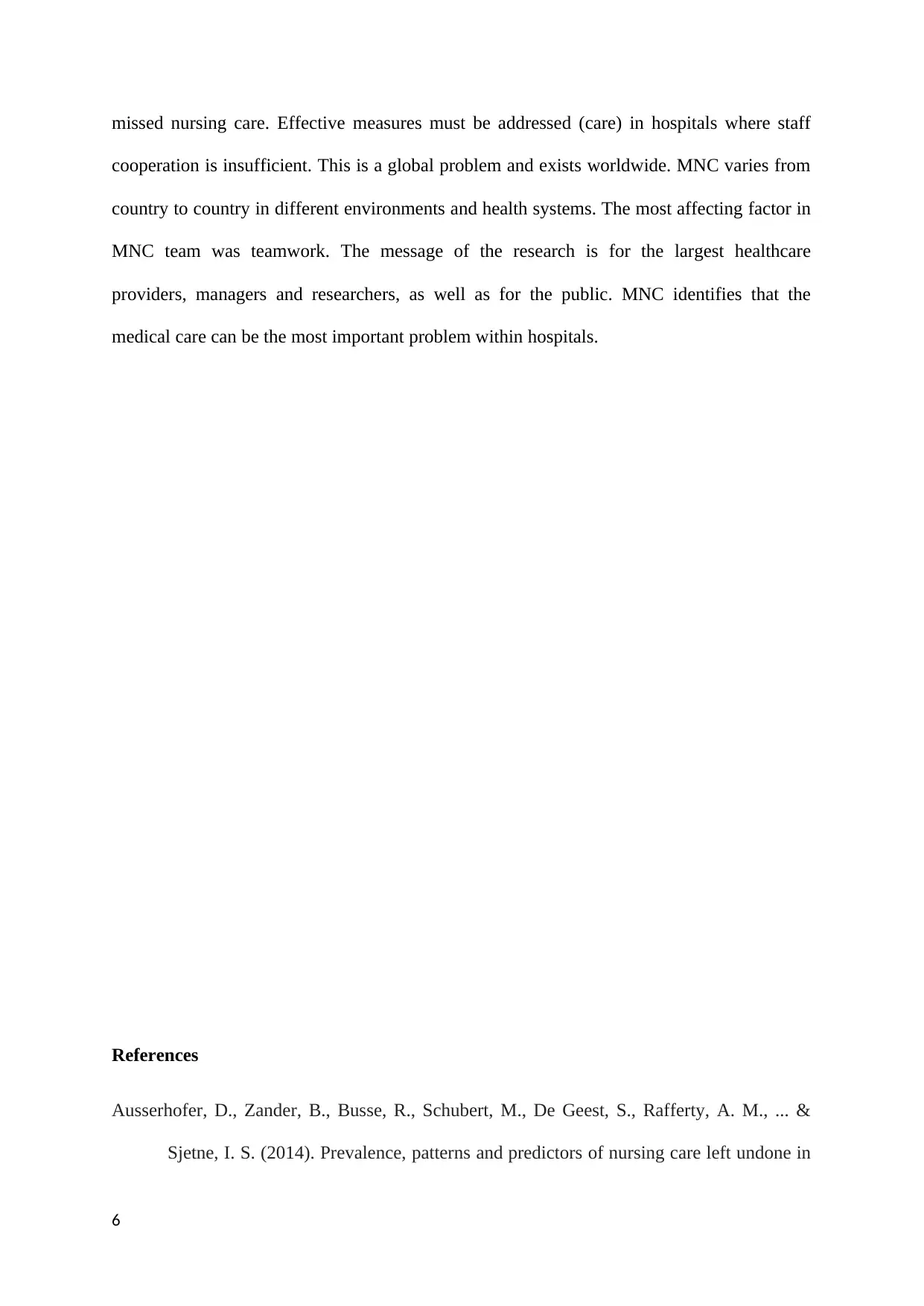
missed nursing care. Effective measures must be addressed (care) in hospitals where staff
cooperation is insufficient. This is a global problem and exists worldwide. MNC varies from
country to country in different environments and health systems. The most affecting factor in
MNC team was teamwork. The message of the research is for the largest healthcare
providers, managers and researchers, as well as for the public. MNC identifies that the
medical care can be the most important problem within hospitals.
References
Ausserhofer, D., Zander, B., Busse, R., Schubert, M., De Geest, S., Rafferty, A. M., ... &
Sjetne, I. S. (2014). Prevalence, patterns and predictors of nursing care left undone in
6
cooperation is insufficient. This is a global problem and exists worldwide. MNC varies from
country to country in different environments and health systems. The most affecting factor in
MNC team was teamwork. The message of the research is for the largest healthcare
providers, managers and researchers, as well as for the public. MNC identifies that the
medical care can be the most important problem within hospitals.
References
Ausserhofer, D., Zander, B., Busse, R., Schubert, M., De Geest, S., Rafferty, A. M., ... &
Sjetne, I. S. (2014). Prevalence, patterns and predictors of nursing care left undone in
6
⊘ This is a preview!⊘
Do you want full access?
Subscribe today to unlock all pages.

Trusted by 1+ million students worldwide
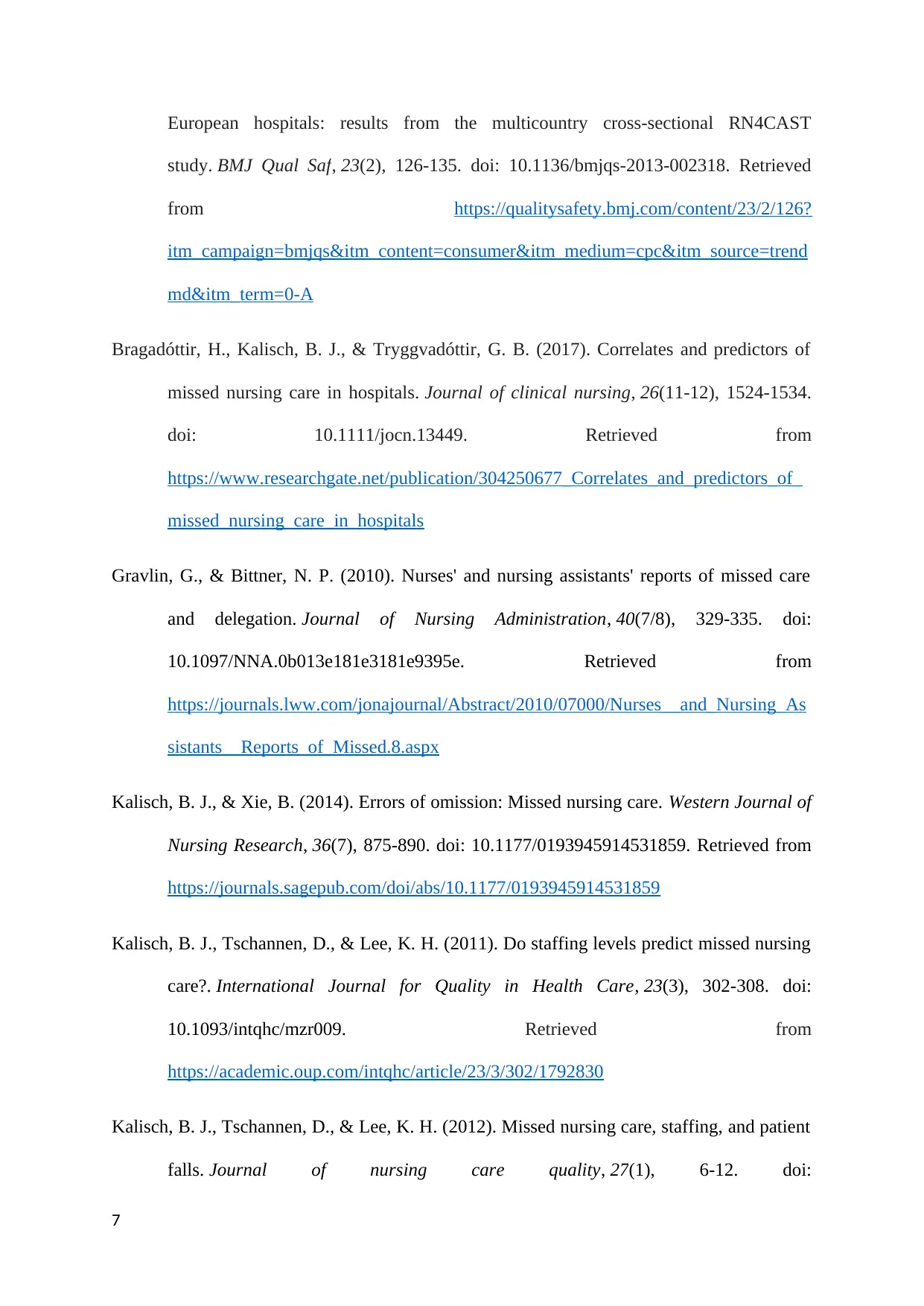
European hospitals: results from the multicountry cross-sectional RN4CAST
study. BMJ Qual Saf, 23(2), 126-135. doi: 10.1136/bmjqs-2013-002318. Retrieved
from https://qualitysafety.bmj.com/content/23/2/126?
itm_campaign=bmjqs&itm_content=consumer&itm_medium=cpc&itm_source=trend
md&itm_term=0-A
Bragadóttir, H., Kalisch, B. J., & Tryggvadóttir, G. B. (2017). Correlates and predictors of
missed nursing care in hospitals. Journal of clinical nursing, 26(11-12), 1524-1534.
doi: 10.1111/jocn.13449. Retrieved from
https://www.researchgate.net/publication/304250677_Correlates_and_predictors_of_
missed_nursing_care_in_hospitals
Gravlin, G., & Bittner, N. P. (2010). Nurses' and nursing assistants' reports of missed care
and delegation. Journal of Nursing Administration, 40(7/8), 329-335. doi:
10.1097/NNA.0b013e181e3181e9395e. Retrieved from
https://journals.lww.com/jonajournal/Abstract/2010/07000/Nurses__and_Nursing_As
sistants__Reports_of_Missed.8.aspx
Kalisch, B. J., & Xie, B. (2014). Errors of omission: Missed nursing care. Western Journal of
Nursing Research, 36(7), 875-890. doi: 10.1177/0193945914531859. Retrieved from
https://journals.sagepub.com/doi/abs/10.1177/0193945914531859
Kalisch, B. J., Tschannen, D., & Lee, K. H. (2011). Do staffing levels predict missed nursing
care?. International Journal for Quality in Health Care, 23(3), 302-308. doi:
10.1093/intqhc/mzr009. Retrieved from
https://academic.oup.com/intqhc/article/23/3/302/1792830
Kalisch, B. J., Tschannen, D., & Lee, K. H. (2012). Missed nursing care, staffing, and patient
falls. Journal of nursing care quality, 27(1), 6-12. doi:
7
study. BMJ Qual Saf, 23(2), 126-135. doi: 10.1136/bmjqs-2013-002318. Retrieved
from https://qualitysafety.bmj.com/content/23/2/126?
itm_campaign=bmjqs&itm_content=consumer&itm_medium=cpc&itm_source=trend
md&itm_term=0-A
Bragadóttir, H., Kalisch, B. J., & Tryggvadóttir, G. B. (2017). Correlates and predictors of
missed nursing care in hospitals. Journal of clinical nursing, 26(11-12), 1524-1534.
doi: 10.1111/jocn.13449. Retrieved from
https://www.researchgate.net/publication/304250677_Correlates_and_predictors_of_
missed_nursing_care_in_hospitals
Gravlin, G., & Bittner, N. P. (2010). Nurses' and nursing assistants' reports of missed care
and delegation. Journal of Nursing Administration, 40(7/8), 329-335. doi:
10.1097/NNA.0b013e181e3181e9395e. Retrieved from
https://journals.lww.com/jonajournal/Abstract/2010/07000/Nurses__and_Nursing_As
sistants__Reports_of_Missed.8.aspx
Kalisch, B. J., & Xie, B. (2014). Errors of omission: Missed nursing care. Western Journal of
Nursing Research, 36(7), 875-890. doi: 10.1177/0193945914531859. Retrieved from
https://journals.sagepub.com/doi/abs/10.1177/0193945914531859
Kalisch, B. J., Tschannen, D., & Lee, K. H. (2011). Do staffing levels predict missed nursing
care?. International Journal for Quality in Health Care, 23(3), 302-308. doi:
10.1093/intqhc/mzr009. Retrieved from
https://academic.oup.com/intqhc/article/23/3/302/1792830
Kalisch, B. J., Tschannen, D., & Lee, K. H. (2012). Missed nursing care, staffing, and patient
falls. Journal of nursing care quality, 27(1), 6-12. doi:
7
Paraphrase This Document
Need a fresh take? Get an instant paraphrase of this document with our AI Paraphraser
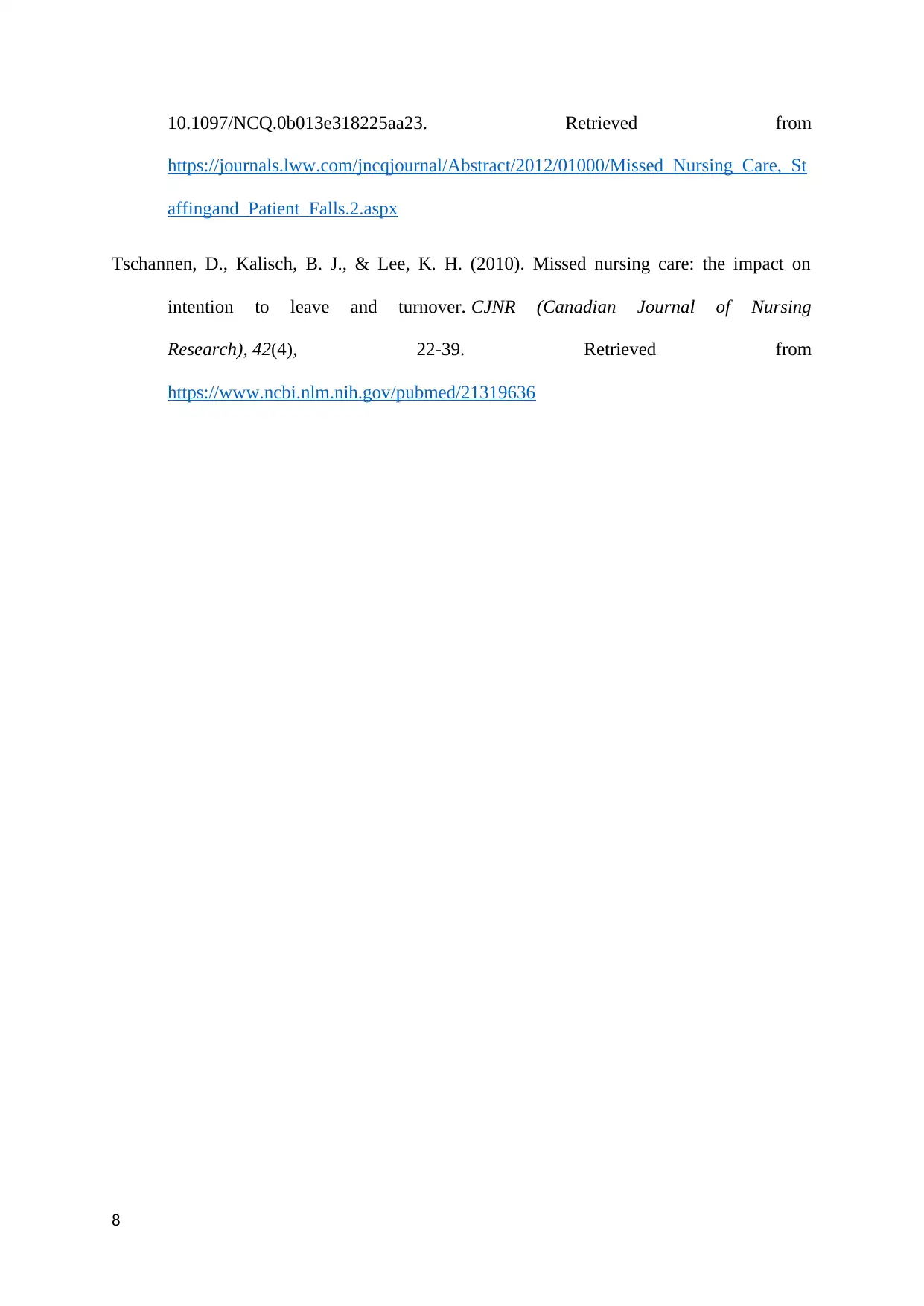
10.1097/NCQ.0b013e318225aa23. Retrieved from
https://journals.lww.com/jncqjournal/Abstract/2012/01000/Missed_Nursing_Care,_St
affingand_Patient_Falls.2.aspx
Tschannen, D., Kalisch, B. J., & Lee, K. H. (2010). Missed nursing care: the impact on
intention to leave and turnover. CJNR (Canadian Journal of Nursing
Research), 42(4), 22-39. Retrieved from
https://www.ncbi.nlm.nih.gov/pubmed/21319636
8
https://journals.lww.com/jncqjournal/Abstract/2012/01000/Missed_Nursing_Care,_St
affingand_Patient_Falls.2.aspx
Tschannen, D., Kalisch, B. J., & Lee, K. H. (2010). Missed nursing care: the impact on
intention to leave and turnover. CJNR (Canadian Journal of Nursing
Research), 42(4), 22-39. Retrieved from
https://www.ncbi.nlm.nih.gov/pubmed/21319636
8
1 out of 8
Related Documents
Your All-in-One AI-Powered Toolkit for Academic Success.
+13062052269
info@desklib.com
Available 24*7 on WhatsApp / Email
![[object Object]](/_next/static/media/star-bottom.7253800d.svg)
Unlock your academic potential
Copyright © 2020–2026 A2Z Services. All Rights Reserved. Developed and managed by ZUCOL.





